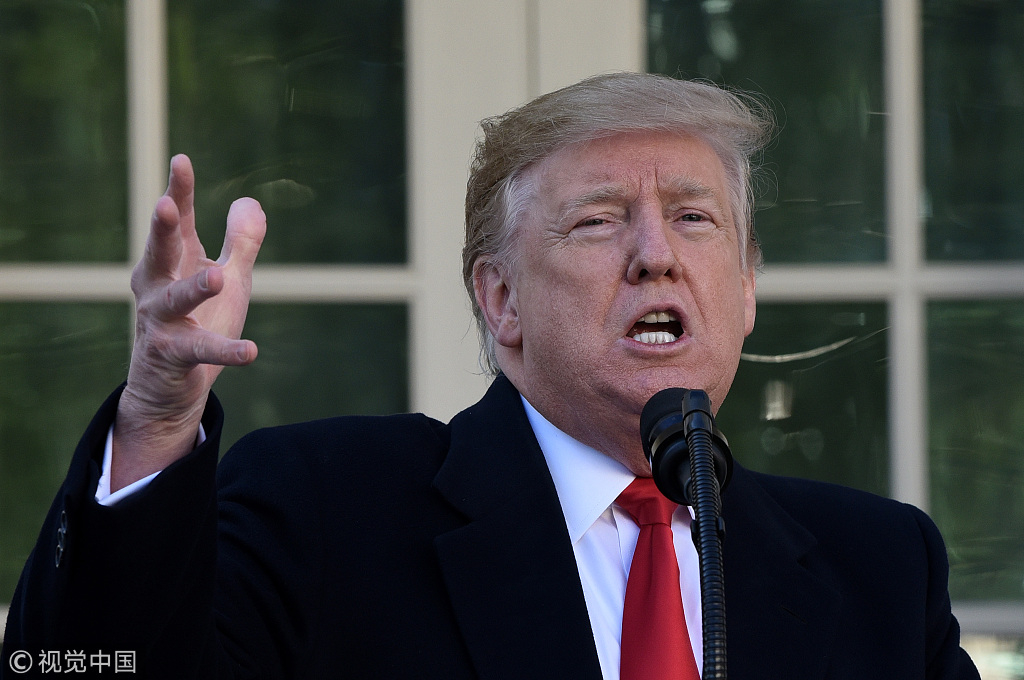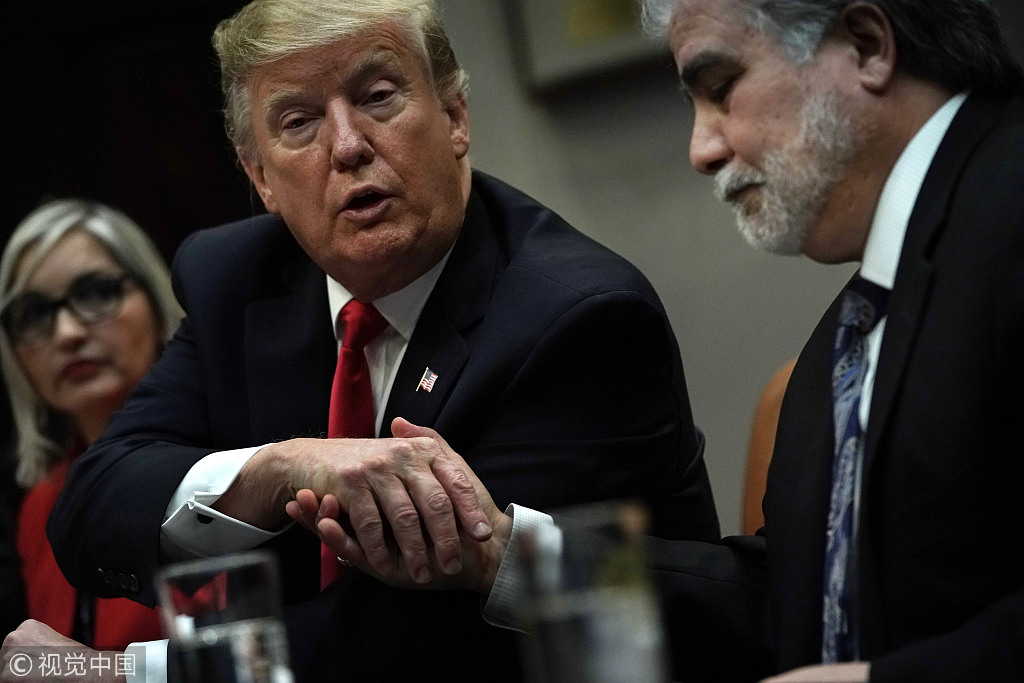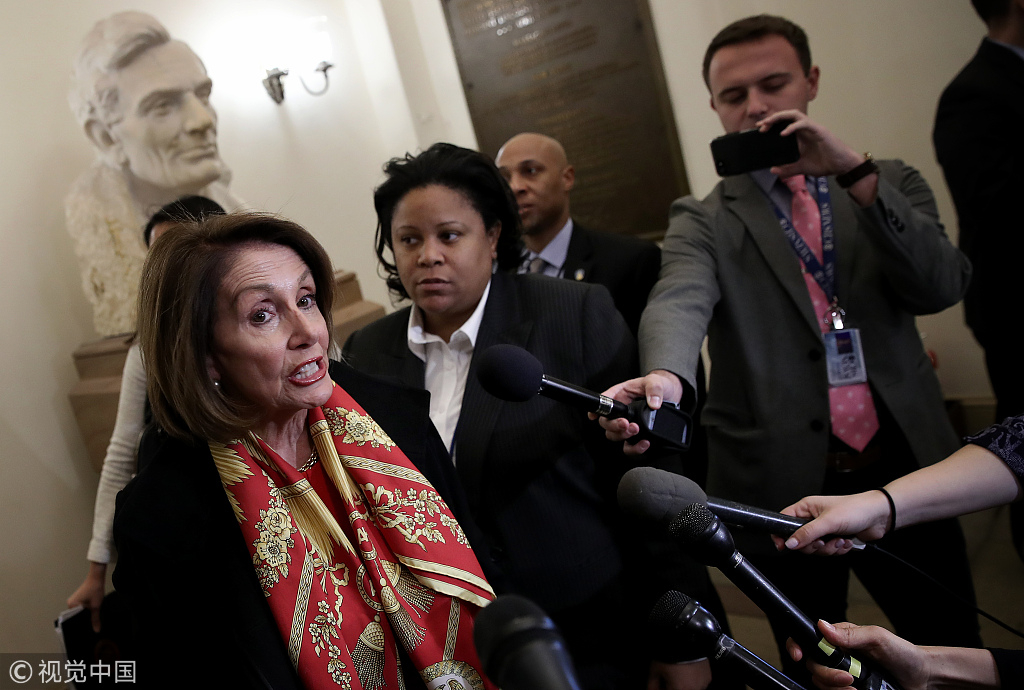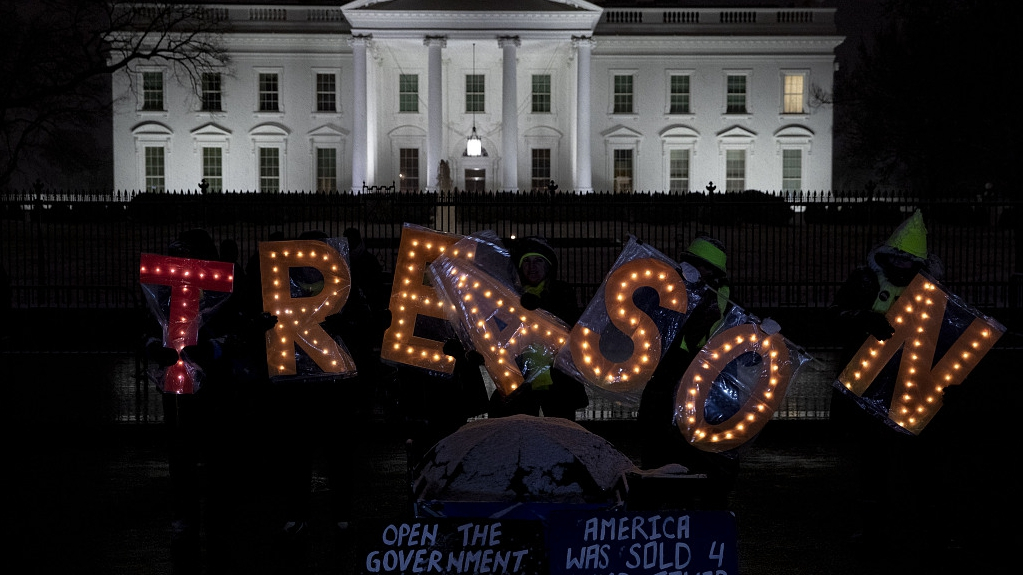Editor's note: Dr. Yuan Sha is an assistant research fellow at the Department for American Studies at the China Institute of International Studies. The article reflects the author's opinion, and not necessarily the views of CGTN.
As two competing plans proposed by U.S. President Donald Trump and House Democrats respectively failed on the Senate floor the previous day, the longest government shutdown in U.S. history seemed to have no end in sight. Then a breakthrough came as President Trump announced he would re-open the federal government on Friday. How did this dramatic turn of events happen and who won in this showdown?
Trump reverses on his position
Amid mounting pressure against the historic government shutdown, President Trump finally softened his stance and signed a bill to open the U.S. government for three weeks, which quickly got passed in the U.S. Senate.

U.S. President Donald Trump makes a statement announcing that a deal has been reached to reopen the government through February 15 during an event in the Rose Garden of the White House January 25, 2019, in Washington, DC. /VCG Photo.
U.S. President Donald Trump makes a statement announcing that a deal has been reached to reopen the government through February 15 during an event in the Rose Garden of the White House January 25, 2019, in Washington, DC. /VCG Photo.
This sudden reversal of positions amounts as a rare move of concession, as Trump caved into the Democrats' insistence to open the government before negotiations for the funding for his signature border wall.
Despite remaining adamant on the “humanitarian and security crisis on our southern border,” Trump tried to reframe the border wall as a “smart wall” instead of a “medieval wall,” a “powerful wall or steel barrier” instead of a “2,000 miles of concrete wall from sea to shining sea.” And he scrapped the “down payment” request which he urged the previous day.
He also expressed his appreciation for the federal workers and praised them as “incredible patriots,” in an attempt to stem the hit his reputation took due to Democrat accusations of him being callous to workers. After all, he is the president of the United States, not the cheerleader of his political base.
But he still put the declaration of a national emergency over the border wall on the table when he threatened, “If we don't get a fair deal from Congress, the government will either shut down on February 15 again, or I will use the powers afforded to me under the laws and the Constitution of the United States to address this emergency.” A draft of Trump's emergency declaration circled around the previous day, creating the impression that he might finally unleash this controversial weapon.
Trump in a trap of his own making
Despite his defiant posture in making the announcement, President Trump, the self-proclaimed deal-maker, came out as the clear loser in this game of chicken.

U.S. President Donald Trump (L) shakes hands with Pastor Ramiro Pena (R) of Christ the King Church during a meeting with Hispanic pastors at the Roosevelt Room of the White House, January 25, 2019, in Washington, DC. /VCG Photo.
U.S. President Donald Trump (L) shakes hands with Pastor Ramiro Pena (R) of Christ the King Church during a meeting with Hispanic pastors at the Roosevelt Room of the White House, January 25, 2019, in Washington, DC. /VCG Photo.
With the federal government agencies in paralysis, massive flight delays, food security compromised and hundreds of federal workers furloughed or working without pay, Trump is shouldering much of the blame as the culprit of the shutdown. U.S. public opinion is turning unfavorably toward the border wall, and his approval ratings have dropped to a record low.
He is also losing allies in his own party. Six Republican Senators broke ranks with him and voted to support the Democratic plan to reopen the government the previous day.
As the government reopens, Trump is faring no better. On the one hand, he is losing the bargaining chip in the negotiation for border wall funding, and the Democrats are less unlikely to compromise. On the other hand, he is alienating his conservative supporters who see his moves as capitulating to the Democrats.
He is also embroiled in a larger power grab with the empowered 116th Congress. With Speaker Nancy Pelosi, chastening in this crisis, showing great stamina, deft tactics and enviable power in uniting Democrats in both Chambers, Trump is set to face two more grueling years.
Are the Democrats really winning?
Trump's announcement is widely seen as a victory for House Speaker Nancy Pelosi, but did she really win? It's more complicated than it seems.

U.S. Speaker of the House Nancy Pelosi (L) speaks to members of the press about U.S. President Donald Trump and the State of the Union speech while she returns to the U.S. Capitol, January 23, 2019, in Washington, DC. /VCG Photo.
U.S. Speaker of the House Nancy Pelosi (L) speaks to members of the press about U.S. President Donald Trump and the State of the Union speech while she returns to the U.S. Capitol, January 23, 2019, in Washington, DC. /VCG Photo.
First of all, Congressional Democrats did not emerge unscathed out of this showdown, as polls indicate they share part of the blame for the shutdown crisis. As the shutdown politics goes beyond the immediate crisis and into the 2020 general elections, it would be tricky for House Democrats to put their reelections at stake.
Secondly, Democrats are rhetorically coerced into admitting the U.S. southern border is a national security issue. The government shutdown has dwindled into a pro and con debate revolving around the effectiveness and efficiency of a border wall, and anyone who denies the importance and urgency of border security is an easy target of being unpatriotic.
Thirdly, the Democrats' tactics also set a bad example of political stalemate and have helped discredit the overall U.S. political system. Americans loathe Congress as much as they distrust the president, and this event further exposes an increasingly large gap of values as the polarity of politics is growing, intensifying partisanship across the aisle.
It's unclear whether the president and the opposition party will be able to reach an agreement in the coming weeks that can keep the government open once and for all. But in this political showdown, nobody comes out as a winner.
(If you want to contribute and have specific expertise, please contact us at opinions@cgtn.com)





